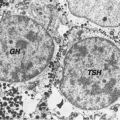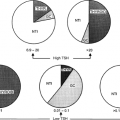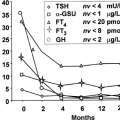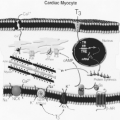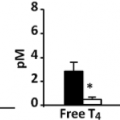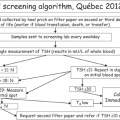Psychiatric and Cognitive Effects of Hypothyroidism
Kathryn G. Schuff
Mary H. Samuels
Peter C. Whybrow
Michael Bauer
Brief Historical Background and Context
The occurrence of psychological and cognitive changes in adults with primary hypothyroidism was first described in the late 19th century (1,2). These early reports described myxedematous patients with a wide range of mental disturbances, from mild irritability to melancholia or “myxedematous madness” (3). Objective laboratory testing and earlier diagnosis of hypothyroidism have markedly reduced the incidence of severe clinical disease. Modern advances in psychiatry and neuroscience have greatly improved the diagnoses of more subtle mental disturbances in hypothyroidism, as well as our understanding of the underlying neural basis for these processes (4,5,6). However, rare hypothyroid patients continue to present with profound mental disturbances, and it remains important that the clinician be aware of the wide range of behavioral changes that can occur in patients with hypothyroidism.
There are two broad categories of hypothyroidism considered here, based on laboratory testing. Overt hypothyroidism is defined as low serum free T4 (FT4) and elevated serum thyroid stimulating hormone (TSH) levels, while subclinical hypothyroidism is defined as having an elevated serum TSH with normal thyroid hormone (T3 and T4) levels. Subclinical hypothyroidism is particularly common, being present in 5% of young subjects and increasing in older patients, who would be most likely to suffer consequences such as effects of decrements in mood or cognition (7). These two entities will be considered separately in this chapter, although in reality they represent a continuum of thyroid hypofunction. Although mood and cognitive effects are described separately, decrements in one area may affect symptoms in the other area, and so clinical findings may be difficult to separate.
Mechanisms of Psychiatric and Cognitive Effects of Hypothyroidism
There is a large body of evidence from animal studies that supports and provides mechanistic explanations for the early clinical observations, as well as providing a framework for modern clinical studies. Thyroid hormone is critical for structural and functional development of the brain, including areas critical for affective and cognitive processes (8–10, see Chapter 2). Developmental effects include neural growth and maturation, neuronal migration, myelination, axonal projections, synaptogenesis, and synaptic connectivity as well as alterations in neurotransmitter levels.
There are several lines of evidence supporting the continued importance of thyroid hormone in the mature brain. This includes rapid and efficient entry of T4 and T3 into the brain, which is due to energy-dependent, stereospecific, regulated, carrier-mediated transmembrane transport. Transport is part of a highly coordinated, functionally linked mechanism that subsequently results in intracellular conversion of T4 to T3, and transport of the active hormone between glial cells/astrocytes and neuronal cells, contributing to region-specific regulation of T3 delivery to neurons (11–13, see Chapter 6).
The major iodothyronine deiodinases (which mediate the conversion of T4 to T3 and other thyroid hormone metabolites) are present in the brain, especially in the cortex, hippocampus, and cerebellum (14,15). Deiodinase activity plays a major role in determining local levels of T3 within critical brain regions (15). Deiodinase activity is tightly regulated to preserve brain T3 levels. Chronic hypothyroidism leads to upregulation of D2, the deiodinase that converts T4 to the active hormone T3 in pertinent brain regions, and downregulation of D3, the deiodinase that converts T4 to inactive reverse T3 (14,15).
Finally, nuclear T3 receptors are present in high concentrations in the cerebral cortex, hippocampus, caudate, and cerebellum (16,17). Hypothyroidism results in increased nuclear T3 binding capacity in these areas (17). The behavioral and neurologic phenotypes of TR mutant (dominant negative or knockout) mice suggest specific roles of the various TRα and TRβ isoforms in neurologic development, sensory development, and behavior, including emotionality, anxiety, and memory (8,18). Thus, thyroxine is known to be transferred into the brain by specific transporters, it is converted to T3 in a regulated fashion, and T3 interacts with nuclear receptors expressed in specific fashion, supporting the importance of thyroid hormone in neural function.
From a systems perspective, thyroid dysfunction affects the expression of neurotransmitter, neuromodulator, and growth factor systems in the adult rat brain, including the areas that subserve affective and cognitive functions (10,19,20,21,22,23,24). In the hippocampus, thyroid hormone deficiency alters the expression of enzymes that regulate catecholamine, serotonin, and GABA systems (10,24,25). Thyroid hormone has also been demonstrated to modulate serotonin presynaptic and postsynaptic receptors, which may play a role in the response of depressive illness to T3 (26). Finally, adult-onset hypothyroidism in rats reduces the numbers of granule cells of the dentate gyrus
and pyramidal cells of the hippocampal CA1 region, decreases the apical dendritic spine density of the hippocampal CA1 pyramidal neurons, reduces hippocampal synaptic plasticity, and impairs learning (27,28,29). All these effects are primarily mediated through altered gene expression, but non-genomic processes may also modulate neuronal excitability in the hippocampus (30). In sum, these findings provide a mechanistic framework for the clinical observations and studies reviewed in the following sections.
and pyramidal cells of the hippocampal CA1 region, decreases the apical dendritic spine density of the hippocampal CA1 pyramidal neurons, reduces hippocampal synaptic plasticity, and impairs learning (27,28,29). All these effects are primarily mediated through altered gene expression, but non-genomic processes may also modulate neuronal excitability in the hippocampus (30). In sum, these findings provide a mechanistic framework for the clinical observations and studies reviewed in the following sections.
Psychiatric and Cognitive Effects of Overt Hypothyroidism
Subjective psychological complaints in adults with overt hypothyroidism are often nonspecific and ill-defined. Slowing of thought and speech, decreased attentiveness, poor concentration, and diminished interest in others often occur, and the diagnosis may be confused with a depressive mood state. In fact, hypothyroidism may induce a specific melancholic disorder, with crying, loss of appetite, constipation, insomnia, delusions of self-reproach, and rarely suicidal ideation (31,32). Other patients may report symptoms consistent with anxiety. Rarely, severely hypothyroid patients can present with agitation, leading to frank psychosis of the schizophrenic, paranoid, or affective types. Symptoms may include anger, fearfulness, paranoia, and auditory or visual hallucinations (33,34).
Hypothyroid patients without such overt psychiatric symptoms may have more subtle alterations in mood. Objective testing may reveal increased scores on anxiety or depression scales, which can reverse with levothyroxine (L-T4) therapy (6,35,36,37). However, one large, population-based study failed to find an association between hypothyroidism and anxiety or depression (38), although the scales utilized in this study were relatively insensitive to subtle effects.
Overt hypothyroidism has been linked to a wide range of cognitive dysfunction (6,39). General intelligence, as well as specific cognitive domains of attention/concentration, memory, perceptual function, language, psychomotor function, and executive function, can be affected in untreated hypothyroid patients. Memory is the most consistently affected cognitive domain (37,40,41,42,43,44,45). L-T4 treatment is usually effective in treating cognitive decrements in hypothyroidism, although there may not be complete reversal of deficits (32,35,44,45,46,47). Recent functional imaging studies provide objective evidence that brain function is altered in relevant areas in hypothyroid patients, with decreased cerebral blood flow and metabolism globally and in areas that mediate attention, visuospatial processing, and motor speed (48,49,50,51).
Because overt hypothyroidism may present with depression, anxiety, psychosis (rarely), or cognitive decline, serum TSH measurement is warranted in all patients with syndromes of affective illness or impaired cognitive function. This is particularly true in women, patients resistant to antidepressant drugs, patients with specific impairments in memory, and patients with atypical psychoses with a substantial cognitive defect, which is uncommon in pure affective psychoses.
Psychiatric and Cognitive Effects of Subclinical Hypothyroidism
As in overt hypothyroidism, symptoms of depression or anxiety may be more common in untreated subclinical hypothyroid patients, compared to the general population (6,7,37,52,53). However, this is not a universal finding (54,55,56,57,58), and there are two randomized, placebo-controlled, blinded studies of L-T4 therapy in subjects with subclinical hypothyroidism which showed no improvement in depression or psychological distress scores (59,60). In one study, therapy actually worsened anxiety (60).
Stay updated, free articles. Join our Telegram channel

Full access? Get Clinical Tree


